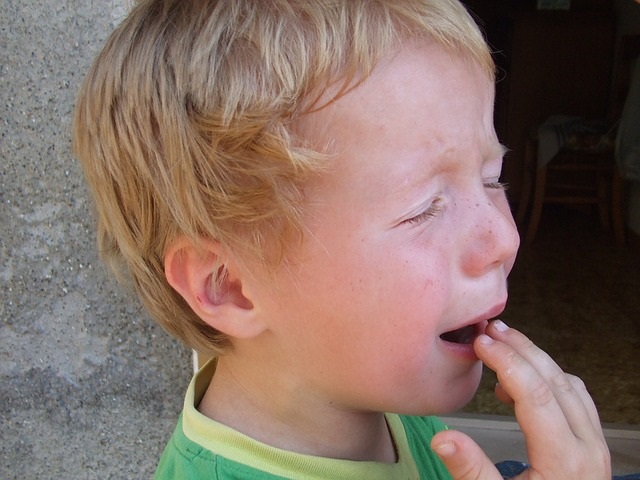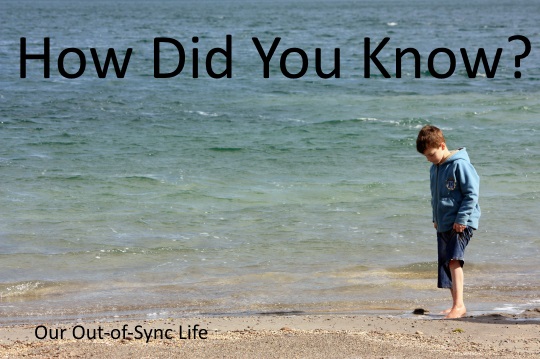One question that I frequently receive is “How did you know that there was something ‘wrong’ with Bubs?” One friend specifically wanted to know if we discovered the issues after having other children and if it was something that others saw. Good questions!
Bubs developed on or ahead of schedule as a baby. There wasn’t anything that concerned us at the beginning because we associated everything to his month NICU (neo-natal intensive care unit) and CVICU (cardiovascular) stay after having open-heart surgery. We figured he would be behind in a few areas, but that he would eventually catch up. Watching for and expecting gross motor delays, we never thought about emotional and social development.
Around 18 months of age, we saw that Bubs reacted to things much differently than typical children. One of my first memories waving a red flag is of Bubs throwing a fit on the floor for an unusually long time. My second memory is how he reacted when I poured his syrup in the wrong place on his plate. Something so simple as this would cause a 90-minute crying melt-down. And, we are not talking about just a few tears. This was a long, loud, inconsolable screaming fit.
Around two years old, Bubs would wake from naps screaming. This is probably about the time that the night terrors began. I talked to other moms but they just didn’t get what I was saying. When Bubs was about 2 1/2, I found the book Raising Your Spirited Child: A Guide for Parents Whose Child Is More Intense, Sensitive, Perceptive, Persistent, and Energetic. Reading only the first page, I found tears coming to my eyes. Finally, I was reading something that mirrored our little Bubs. Although I related to this book, sadly I didn’t find ideas that brought us help.
Looking back I see multiple hints that we missed. Bubs screamed when a noisy piece on his exersaucer was spun (volume). Baby food was not happening (texture). For several years, Bubs freaked out over the baby mobile. Bubs would scream and scream at night inconsolably. There was nothing that we could do to help him calm down enough to sleep. Actually, when we tried it made it worse.
These are just four things that I look back and realize were sensory issues. Sadly, Bubs was our first baby and we had nothing to compare it to. To add to the problem, other people didn’t see the issues like we did or they saw very small windows so when so talking to others wasn’t helpful.
The older Bubs got the more we realized “this” was not a discipline issue. Thinking Bubs was an extremely strong-willed child, we tried to use different discipline and reward methods to help him get control of himself. But, we could not discipline him out of his meltdowns or encourage him so that he could get control. We needed to learn how to help him gain control and work through his fears.
We did not know where to turn.
We could find no one who understood what we were dealing with.

Our pediatrician was the one who lead us to an occupational therapist who specialized in Sensory Processing Disorder. We realized that Bubs’ issues stemmed from his inability to understand and deal with sensory input. It was once we started the OT that we began to see the vast improvements in our son.
As we near Bubs’ seventh birthday, we still see issues arise that stem back to his first month of life. I am very happy to say that doctors are now seeing the importance of monitoring these released NICU babies very closely and almost immediately get them into therapy. Instead of just watching these babies’ health, doctors are now looking at all the aspects. For these families and their babies, I am so thankful.
Update: This post was written 4 years ago. After two years of Occupational Therapy and now almost 4 years of speech therapy, Bubs has made huge gains. He still fears loud noises and gets easily overwhelmed. He struggles in social situations and with focus. But, I praise God that we are able to provide him the professional help he needs.
If you find yourself wondering if there is more going on than the basic age-appropriate behavior, I can not encourage you enough to seek help from a pediatrician, occupational therapist, or speech therapist. And don’t wait. Early intervention is key.
After reading this blog post, Nancy emailed the following resources which she has found helpful.
- A Sensory World DVD
- The Out-of-Sync Child
- Raising a Sensory Smart Child: The Definitive Handbook for Helping Your Child with SensoryProcessing Issues
Sensory Processing Disorder
ADD/ADHD
Autism
Spirited Child
Our Story


My child was also diagnosed with SPD..many people still think she is just going through a phase but I know that her issues are related to her nervous system and how she processes the senses. Once we started getting OT for her she has made major improvements. I wish you the best with your similar journey. Thanks for recommending the book. I plan to read it and encourage my family to as well.
I've just "discovered" your site in a round about way. This post pulls at my heart. Our little man has sensory processing issues as well, though not as extreme, I think as your Bubs. His delays cover just about everything, so it's sometimes hard to know what the root cause of some behavior is. I'm so thankful that you were willing to even look at other alternatives besides "disciplining him out of his fits". Children with sensory issues still need discipline, of course, but a unique approach needs to be considered.
I look forward to reading more here, as I have time! My blogging has definitely taken a back seat over the past year, but I'm always thankful when I find blogs like yours. Thanks again!
I just started reading Raising Your Spirited Child from our church library after being bit on the shoulder during worship and feeling utterly desperate to find some way of handling my child. And in the first chapter I've gotten through, I thought, this woman is describing a kid with SPD. She just calls it by a different name. I too had no idea until I had my 2nd child, thankfully just 11 months after my first… but that still left me clueless as to how to cope. We've been in OT for over a year, from before age 2, and if this is what she's like with it, I don't want to imagine life without it!
Stephanie – I am so glad that OT is helping so much. It was a huge blessing to us. I sat in on the sessions and learned along with Bubs. Then I could implement at home what they were doing in therapy.